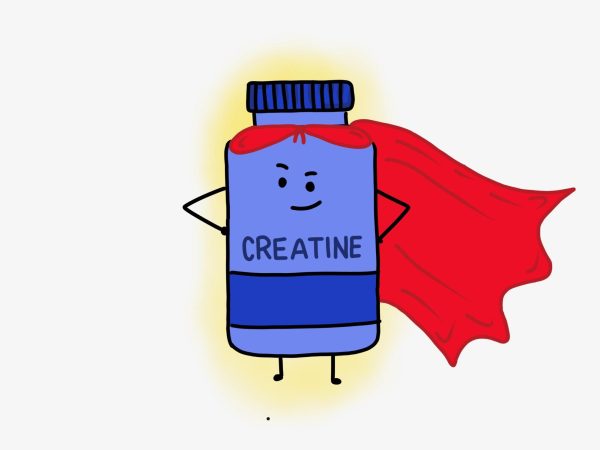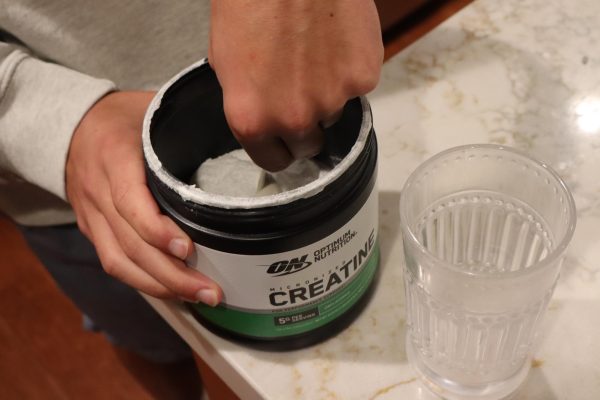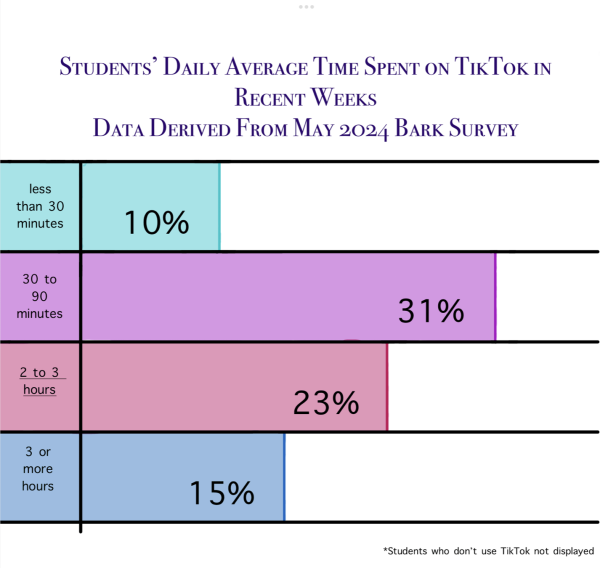Once dismissed as a supplement only for “gym bros”, creatine is now making its way into the wellness routines of teenagers, adults and even the elderly. Despite its reputation as a muscle-building aid, the chemical compound offers benefits that extend far beyond bodybuilding.
“Most of my friends make fun of me for taking [creatine] because there’s this mainstream idea that [it’s] only for gym bros and athletes. But I think it’s for everyone: girls, boys, teenagers, adults and elderly,” said “Anna,” who asked to remain anonymous because of the false stereotypes surrounding the supplement.
For decades, companies like Optimum Nutrition, MuscleTech, and Bio-Engineered Supplements aggressively marketed creatine to young men seeking to increase strength and muscle mass. Yet, recent research has revealed a broader range of potential health benefits — from improved cognitive function to faster recovery in aging adults — prompting even healthcare professionals to reconsider its value.
Nurse practitioner and wellness coach in Marin County, Dr. Jill Baker, initially bought into the stigma that Anna witnessed surrounding creatine. Yet more profound research unveiled a litany of advantages, ultimately changing her perspective.
“I had only known creatine as something I would see men take to make their muscles bigger, so I never thought much of it. But I started digging a little deeper and found that [it] has enormous benefits. Now I’m [creatine’s] biggest advocate,” Baker said.
While millions of Americans take creatine in supplement form, nearly everyone consumes it daily — just not enough.
“It’s an amino acid that is found in all complete protein sources, like red meat [or seafood],” Baker said. “The problem is that the typical diet that most people have does not contain enough creatine.”
Creatine, the world’s most extensively researched dietary supplement, is well-known for its ability to amplify strength and athletic performance. However, its effects on cognitive function could be considered its most significant advantage.
“What sold me on [creatine] is its impact on brain health. Some studies show it supports mood by regulating how neurotransmitter building blocks are produced. Creatine helps with mood in the same way an [anti-depressant] helps with mood,” Baker said.
In 2018, the National Institutes of Health published a systematic review summarizing findings from 53 studies examining creatine’s impact on the brain. The results were unequivocal: creatine improved memory, reaction time and executive function while significantly mitigating the effects of sleep deprivation and age-related cognitive decline.
“The brain health benefits are so compelling to me,” Baker said. “[The fact that] we can have a little more clarity and that our moods can [improve] is amazing.”

With considerable experience working alongside professional athletes, creatine is one of the first things Dr. Josh Heenan, a strength coach, recommends to his clients. Similar to Baker, he admires the positive impact the compound can have on the brain.
“High doses of creatine — more than 10 grams a day — have been shown to support recovery from concussions by boosting brain energy, reducing inflammation and aiding cognition,” Heenan said.
Yet creatine’s ability to heal the brain extends well beyond concussions; studies prove it can combat migraines, post-traumatic stress disorder, traumatic brain injuries in children and other neurological diseases, albeit with a higher-than-normal dosage — as Heenan mentioned. Although most of the general population does not face such specific health issues, the benefits of creatine on the brain are evident.
As sleep deprivation has reached unprecedented levels, with the Center for Disease Control reporting that 73 percent of high school students lack sufficient sleep, creatine may be more valuable than ever. Senior Ryan Scott began taking the supplement to improve his gym performance but has also seen an increase in energy levels.
“I’ve felt my overall energy throughout the day increase significantly. I don’t get nearly as tired as I used to,” Scott said.
When creatine enters the body, it’s stored in muscles as the molecule phosphocreatine. As the body uses up adenosine triphosphate (ATP), whether during exercise or throughout daily activities, creatine regenerates ATP, providing additional energy.
“When I’m exercising, I feel so much more energetic, like I’m given an extra boost,” Anna said.
The energy boost is prevalent during high-intensity training, where athletes exert maximum effort for a short period.
“During activities with quick bursts [around] 10 seconds of work, our body utilizes creatine as a fuel source, giving us more readily available energy,” Heenan said. “This allows high-level athletes to improve performance by increasing the length and force with which they can output maximum effort.”
The performance boosts were first publicized after British sprinters Lindford Christie and Sally Gunnell won gold in the 1992 Barcelona Olympics, claiming they benefited from creatine supplementation. In the following years, the compound was researched heavily, and by the 1996 Olympics in Atlanta, it was estimated that 80 percent of the athletes were taking creatine. And for good reason, as studies found significant evidence backing creatine improving athletic performance.
“The use of creatine has been shown to increase lean body mass, decrease short sprint times [and] increase vertical jump [height],” Heenan said.
Since its rise in the 1990s, creatine has evolved from a niche supplement used by Olympians to a performance enhancer used by athletes and non-athletes alike. Scott, a weightlifter, attributes some of his success to the supplement, which has been found to increase strength in compound lifts between 16 to 43 percent. Like Baker, he recommends it to those who are physically fit and active.
“Creatine has improved the quickness of my muscle growth and also my muscle recovery. I strongly believe all athletes and anyone engaging in physical activity should be taking it,” Scott said.

In an era where sports specialization in high schoolers is more common than ever, athletes often endure year-round practices, weight training and conditioning. This burdens the body immensely, making recovery essential to avoid injuries and heighten performance.
“I have practice or weights almost every single day of the year. But [after I started taking creatine], I don’t get nearly as sore after working out or after a game. It has significantly improved my recovery,” Anna said.
Baker highly recommends the compound for athletes who subject their bodies to significant physical strain.
“It’s a really good idea to take creatine for people who are working out a lot. It’s easy to have a depletion of energy if you’re not getting enough fuel, and that leads to muscle and bone breakdown and more injuries. If you’re really loading up your body and pushing yourself physically, [taking creatine] is a good idea to prevent injury,” Baker said.
Despite its numerous benefits and the abundance of studies, creatine still has a negative reputation.
“I never wanted to take [creatine] because I had heard all these misconceptions about [gaining] weight and getting bulky,” Anna said. “But I kept getting hurt, and I read a few studies about creatine helping reduce injuries, so I decided to [try it out]. I haven’t looked back since.” Creatine supplementation may cause an initial weight gain between two to four pounds due to increased water retention in the muscles. However, over time, the compound promotes fat loss and lean muscle growth, leading many users to lose weight in the long run.
“People often think that creatine will make them ‘big,’” Baker said. “This is not the case at all. On creatine, we hold a little more water in our muscles, but not very much, so it’s certainly not making people fat.”
Most of those who gain significant weight are overdosing on creatine, taking much more than the recommended grammage.
“For [those] who use [creatine] to make themselves really big and strong, they’re taking huge dosages,” Baker said. “That’s not necessary. Everybody can take 3-5 grams a day and have a big impact on their clarity, on their mood and their bone health.”
Unfortunately, the data surrounding creatine’s impact on adolescents is menial, but Baker is skeptical there are any issues.
“There’s not much data for people under 18, but I doubt there are any problems with [adolescents] taking it. It just hasn’t been studied [on the youth],” Baker said. “But this is a supplement known to be very safe.”
Supplements come in many forms: powder, gummies, pills and drinks. Baker, along with many other experts, contends that form does not matter as long as users take three to five grams of creatine daily. The Vitamin Shoppe, the world’s largest vendor of creatine, asserts that creatine usage is increasing nationally, specifically among women and the elderly. New studies continue to dispel the common misconceptions about creatine, highlighting the versatile benefits that all demographics can enjoy. Always consult a doctor before using creatine.








